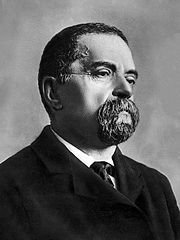Giovanni Schiaparelli
| Giovanni Schiaparelli | |
|---|---|

Giovanni Schiaparelli
|
|
| Born | Giovanni Virginio Schiaparelli 14 March 1835 Savigliano, Kingdom of Sardinia |
| Died | 4 July 1910 (aged 75) Milan, Italy |
| Nationality | Italian |
| Fields | Astronomy |
Giovanni Virginio Schiaparelli (Italian: [dʒoˈvanːi virˈdʒinjo skjapaˈrɛlːi]; 14 March 1835 – 4 July 1910) was an Italian astronomer and science historian.
He was educated at the University of Turin, and later studied at Berlin Observatory, under Encke. In 1859–1860 he worked in Pulkovo Observatory near St Petersburg, and then worked for over forty years at Brera Observatory in Milan. He was also a senator of the Kingdom of Italy, a member of the Accademia dei Lincei, the Accademia delle Scienze di Torino and the Regio Istituto Lombardo, and is particularly known for his studies of Mars.
Among Schiaparelli's contributions are his telescopic observations of Mars. In his initial observations, he named the "seas" and "continents" of Mars. During the planet's "Great Opposition" of 1877, he observed a dense network of linear structures on the surface of Mars which he called "canali" in Italian, meaning "channels" but the term was mistranslated into English as "canals".
While the term "canals" indicates an artificial construction, the term "channels" connotes that the observed features were natural configurations of the planetary surface. From the incorrect translation into the term "canals", various assumptions were made about life on Mars; as these assumptions were popularized, the "canals" of Mars became famous, giving rise to waves of hypotheses, speculation, and folklore about the possibility of intelligent life on Mars, the Martians. Among the most fervent supporters of the artificial-canal hypothesis was the American astronomer Percival Lowell, who spent much of his life trying to prove the existence of intelligent life on the red planet. After Lowell's death in 1916, astronomers developed a consensus against the canal hypothesis, but the popular concept of Martian canals excavated by intelligent Martians remained in the public mind for the first half of the 20th century, and inspired a corpus of works of classic science fiction.
...
Wikipedia
